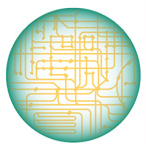Overview of CABBI Conversion Theme
Authors:
Yihui Shen1,* (yihuis@princeton.edu), José Avalos1, Bruce Dean2, David Flaherty3, Jeremy Guest3, George Huber4, Matt Hudson3, Heng Ji3, Yong-Su Jin3, Ting Lu3, Costas Maranas5, Sergei Maslov3, Melanie McReynolds5, Brian Pfleger4, John Shanklin6, Zengyi Shao7, Vijay Singh3, Saurabh Sinha3, Jonathan Sweedler3, Martin Wühr1, Yasuo Yoshikuni8, Chengxiang Zhai3, Joshua Rabinowitz1, Christopher Rao3, and Huimin Zhao3
Institutions:
1Princeton University; 2United States Department of Agriculture, Agricultural Research Service (USDA ARS), Peoria, IL; 3University of Illinois Urbana–Champaign; 4University of Wisconsin–Madison; 5The Pennsylvania State University; 6Brookhaven National Laboratory; 7Iowa State University; and 8Lawrence Berkeley National Laboratory
URLs:
Goals
The overarching goal of the Conversion theme is to investigate the cellular metabolism and gene regulation mechanisms of three non-model yeasts including Issatchenkia orientalis, Yarrowia lipolytica and Rhodosporidium toruloides and to develop new synthetic biology and systems biology tools for characterization and engineering of these yeasts for production of chemicals and fuels from renewable plant biomass.
Abstract
Microorganisms are increasingly used to produce biofuels and chemicals. However, developing robust microorganisms for the economical production of biofuels and bioproducts from low-cost, often-recalcitrant feedstocks at large scale with high titers, rates, and yields (TRYs) remains a significant challenge. Key reasons include: i) lack of understanding of how native metabolism and physiology constrains the production of non-natural compounds; ii) difficulty in identifying compounds that can be efficiently produced in living organisms and the best host, natural or engineered, for doing so; iii) the time-consuming and expensive design-build-test-learn (DBTL) cycle for metabolic engineering; and iv) lack of known enzymes with desired activity and substrate specificity for the synthesis of target natural or non-natural compounds.
To address these scientific challenges, the Conversion theme will build on the accomplishments of the first five years of research and focus on the following main objectives: (1) Develop a self-driving biofoundry for metabolic engineering and enzyme engineering; (2) Develop artificial intelligence (AI)/machine learning (ML) algorithms for biosystem design; (3) Engineer non-model yeasts for cost-effective production of four main target chemicals: 3-hydroxypropanoic acid (3-HP) and citramalate in Issatchenkia orientalis and triacetic acid lactone (TAL) and fatty alcohols in Yarrowia lipolytica and Rhodosporidium toruloides. The metabolic engineering efforts will continue to be accelerated by the tools developed, (4) Investigate the underlying biological mechanisms that lead to high-level production of target products using systems biology and biofoundry; (5) Investigate the molecular basis for genetic instability and develop engineering strategies to create robust production organisms for large-scale fermentation; (6) Develop an end-to-end pipeline coupled with techno-economic analysis/life cycle analysis (TEA/LCA) to demonstrate the process economics for fermentative production of these target chemicals, which not only provides guidance to the metabolic engineering efforts in (3) and (5), but also integrates the Conversion theme with the Feedstock and Sustainability Themes.
To achieve these objectives, researchers have assembled an interdisciplinary team with broad and complementary skills, including experts in metabolic engineering, synthetic biology, systems biology, enzyme engineering, analytical chemistry, catalysis, bioprocessing and fermentation, process economics analysis, data mining and machine learning, and plant synthetic biology.
In this poster, researchers will present an overview of the Center for Advanced Bioenergy and Bioproducts Innovation (CABBI) Conversion research program and highlight one representative project in which multiomics analysis is performed on Sacchromyces cerevisiae and Issatchenkia orientalis to understand their metabolism.
Funding Information
This research was supported by the DOE Office of Science, Office of Biological and Environmental Research (BER), grant no. DE-SC0018420.
